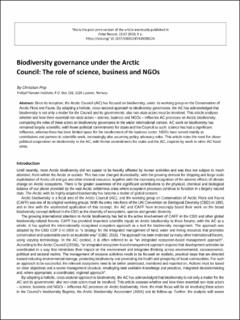| dc.description.abstract | Since its inception, the Arctic Council (AC) has focused on biodiversity, under its working group on the Conservation of Arctic Flora and Fauna. By adopting a holistic, cross-sectoral approach to biodiversity governance, the AC has acknowledged that biodiversity is not only a matter for the Council and its governments: also non-state actors must be involved. This article analyses whether and how three essential non-state actors – science, business and NGOs – influence AC processes on Arctic biodiversity, comparing the roles of these actors on biodiversity governance in the wider international context. AC work on biodiversity has remained largely scientific, with fewer political commitments for states and the Council as such: science has had a significant influence, whereas there has been limited space for the involvement of the business sector. NGOs have served mainly as contributors and partners in scientific work, increasingly also assuming policy advocacy roles. This article notes the need for closer political cooperation on biodiversity in the AC, with firmer commitments for states and the AC, inspired by work in other AC focal areas. | |
